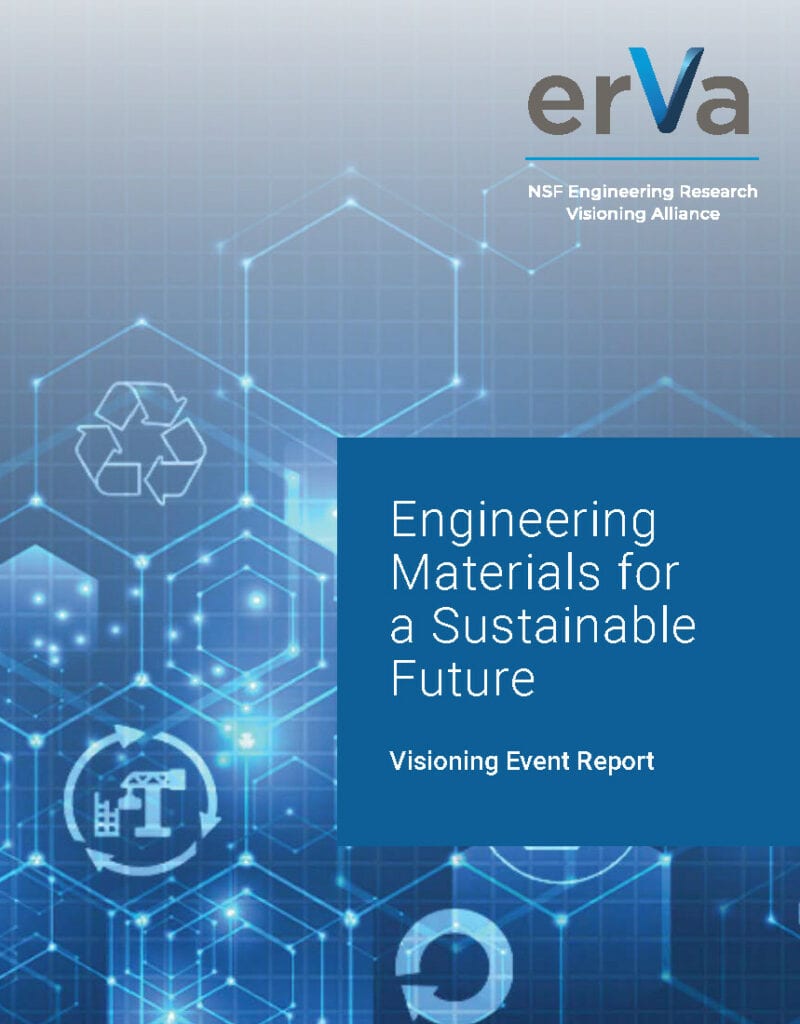Transformative materials for more sustainable concrete, chemicals, and polymers focus of newest report from the Engineering Research Visioning Alliance
February 21, 2024 – Progress toward a more sustainable economy hinges on the ability to design products that have minimal negative impact on the environment and human health, with circularity – the use of regenerative materials – being crucial to prevent waste and resource exhaustion. A new report released today by the Engineering Research Visioning Alliance (ERVA), an initiative funded by the U.S. National Science Foundation (NSF), identifies research priorities and underscores the role the engineering research community can and must play to get there.
According to a 2023 report, circularity has actually declined since 2018. Reimagining the way things are made – from food packaging to the concrete used in bridges and skyscrapers – is necessary for sustainability to prevail. ERVA’s new report, Engineering Materials for a Sustainable Future, identifies innovative, less-explored lines of research that can transform all phases of materials’ lifespan, focusing on concrete, chemicals and polymers. The executive summary and full report, based on a visioning session of 55 engineering researchers, industry leaders, policymakers, and investors held in July 2023 can be found on ERVA’s website here.
“Achieving a sustainable planet demands that we radically innovate the way we make the materials that we benefit from on a daily basis,” said Jennifer Dionne, professor of materials science and engineering, Chan-Zuckerberg Investigator at Stanford University and visioning event co-chair. “Yet, it can take up to a decade to develop a new material. Our aim is to accelerate our thinking about engineering sustainable materials across industries and building a circular materials economy.”
The report discusses the following challenges that research needs to address:
- Design: Developing new materials and methods for their production
- Scale-up and manufacturing: Increasing production to meet demand while maintaining the sustainability of the materials
- End-of-use and reuse: Improving the handling and disposal of materials after they are used in a way that minimizes waste while maximizing value.
The report delves into key research imperatives and focus areas within each of the three grand challenges. “We identified the three big grand challenges we face when it comes to designing sustainable materials, seeking to rally engineers to work toward transformation through groundbreaking research,” said Yael Vodovotz, ERVA technical task force co-chair and professor of food science and technology and director of the Center for Advancement of Food Science and Technology at The Ohio State University.
Engineering Materials for a Sustainable Future is the seventh report released by ERVA, an initiative funded by the NSF to help identify future engineering research directions. Visit ERVA’s website to visit the previous reports: Engineering the Future of Distributed Manufacturing, Engineered Systems for Water Security, Sustainable Transportation Networks Engineering, R&D Solutions for Unhackable Infrastructure, Leveraging Biology to Power Engineering Impact, and The Role of Engineering to Address Climate Change.
ERVA is funded by the Engineering Directorate of the National Science Foundation.
About The Engineering Research Vision Alliance (ERVA): The Engineering Research Visioning Alliance (ERVA) is a neutral convener that helps define future engineering research directions. Funded by the NSF Directorate for Engineering, ERVA is a diverse, inclusive and engaged partnership that enables an array of voices to impact national research priorities. The five-year initiative convenes, catalyzes and enables the engineering community to identify nascent opportunities and priorities for engineering-led innovative, high-impact, cross-domain research that addresses national, global and societal needs. Learn more at ERVAcommunity.org.
